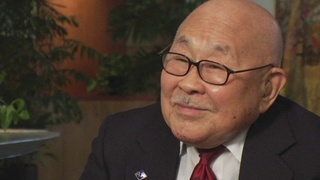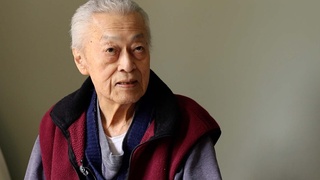Interviews
Government sold Japanese Canadian properties for little money
I don't remember how much of a check he got from them, but only examples I have is a few people who, a guy by the name of Sergeant Shoji. His name was Shoji, he was on the West Coast down in, he had one of the market gardens. And he had signed up in World War I and became a sergeant in the army, Canadian army at that time, because Japan was an ally then, at that time. And at the end of the war, they gave, when he came back, they allowed him to buy some land in the lower mainland of B.C. He got 30 acres of land, 33 acres, and he farmed that into a market garden and made a business. Well, then that was taken away from him and sold, and eventually he received a check from them, I forgot, it was something like seventy-two dollars and fifty cents or something like that. It was a ridiculous figure. And he wrote them a letter, he didn't cash the check, he wrote them a letter and said, "Look, my life works, I fought for Canada, and my life work is not worth seventy-two dollars and fifty cents." More or less, "You can stick it up you-know-where. It's not worth it. I won't accept the check." And I don't know if he ever kept the check or not. It would have been wonderful if he had kept the check, because that would have been a good reminder of what, how some bureaucrats' thinking is. Anyhow, that was sort of the idea. We had very, they got very, very little money for the amount of property that was sold, and eventually they got a, the Bird Commission, it was so bad that they decided they would have to have a, have a commission that came together, and they looked at everything and, again, and they realized that, they said, "No, the government made a mistake, they sold the property for too low, a lot of the people are owing millions of dollars," and so my father did get a few more, a few more thousand dollars from it, but not that much.
Date: July 25 & 26, 2006
Location: Washington, US
Interviewer: Tom Ikeda
Contributed by: Denshō: The Japanese American Legacy Project.
Explore More Videos

Influence of Mexican culture after returning from camp
(b. 1943) Japanese American transgender attorney

A conversation with a farmer in Kansas
(b. 1939) Japanese American painter, printmaker & professor

Dancing in Japan as an American, in the US as Japanese
(1918-2023) Nisei Japanese kabuki dancer

Discrimination in San Francisco
(1914–2015) Nisei YMCA and Japanese American community leader

Collection of artifacts depicting racial stereotypes influences art
(b. 1939) Japanese American painter, printmaker & professor

Encountering racial discrimination at a public swimming pool
(b. 1923) Nisei from Washington. Resisted draft during WWII.

His testimony has more credibility because of his race
(1922 - 2005) Former U.S. Army counterintelligence officer

Gender discrimination in education field
(1925 - 2018) Nisei educator from Hawai‘i

Learned what it meant to be called “Jap” in Heart Mountain
(1934–2018) Japanese American designer, educator, and pioneer of media technologies

First impression of New York City during war time
(1915 - 2011) Nisei florist who resettled in New York City after WW II. Active in Japanese American civil rights movement

The day Pearl Harbor was bombed
(1922–2014) Political and civil rights activist.

Not bringing shame to family
(1926 - 2012) Scholar and professor of anthropology. Leader in the establishment of ethnic studies as an academic discipline

Past ties to present situation in Middle East
(1926 - 2012) Scholar and professor of anthropology. Leader in the establishment of ethnic studies as an academic discipline

Didn't have rights that whites had
(1922–2014) Political and civil rights activist.

Californians didn't know about evacuation
(1922–2014) Political and civil rights activist.
